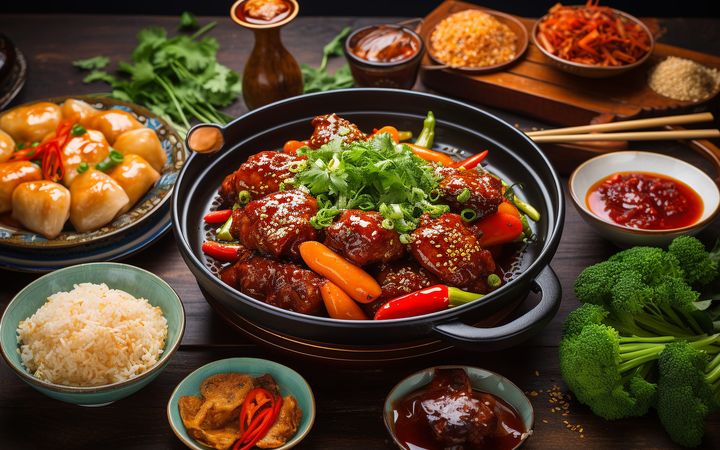The recent viral debate over pre-made meals (yuzhicai) in China has sparked a global conversation. Are they a safe, convenient solution for modern life or a threat to culinary culture and health? We dive deep into both sides of the argument to help you decide.
The Pre-Made Meal Debate: Convenience Compromise or Culinary Revolution?
Over the past few days, a fiery debate has exploded across Chinese social media and quickly captured international attention. The subject? Pre-made meals (预制菜, yùzhīcài). What began as a discussion about their use in school cafeterias has evolved into a full-blown cultural conversation about how we eat in the 21st century. Is this trend a welcome innovation that fits our fast-paced world, or is it a step towards a bland, unhealthy future? Let’s unpack the arguments from both sides.
What Exactly Are Pre-Made Meals? Defining the Controversy
Pre-made meals are dishes that have been prepared, cooked, portioned, and packaged in a central kitchen or factory. They require minimal effort from the consumer—often just heating in a microwave or boiling in a bag. This category includes ready-to-eat meals, meal kits with pre-chopped ingredients, and prepared dishes for restaurants. The recent controversy, particularly in China, stems from the fear that this industrial approach is invisibly taking over, replacing freshly cooked food in settings where people expect it most, like local restaurants and schools.
The Case For: Why Pre-Made Meals Are Gaining Popularity
Proponents argue that pre-made meals are a logical and necessary evolution in food technology, addressing several modern challenges.
The Ultimate Time-Saver for Busy Lifestyles
In an era where time is the ultimate luxury, pre-made meals offer an undeniable convenience. For dual-income families, busy professionals, and exhausted parents, they provide a way to put a hot, varied meal on the table in minutes without the hassle of shopping, chopping, and cleaning. They eliminate the decision fatigue of “what’s for dinner?” and are a strong ally against the temptation of less healthy takeout.
Consistency, Safety, and Reduced Waste
From a business and safety perspective, pre-made meals are a game-changer. Large-scale production ensures strict hygiene standards and consistent taste and quality every time, whether you’re in Beijing or Berlin. For restaurants, it reduces reliance on skilled chefs, lowers costs, and ensures a menu item tastes the same regardless of who is in the kitchen. Furthermore, industrial-scale preparation can lead to less food waste through precise portion control and better inventory management.
The Case Against: The Core of the Public’s Fear
Despite the practical benefits, a significant portion of the public remains deeply skeptical, driven by concerns that go beyond mere convenience.
The “Soul-Less” Food: Loss of Culinary Heritage
The most potent argument against pre-made meals is cultural. Food is not just fuel; it’s a cornerstone of tradition, family, and identity. Critics argue that replacing home-cooked and chef-prepared meals with standardized, factory-made products severs this emotional connection. The fear is that we are trading the unique, imperfect, and love-infused “wok hei” of a stir-fry for a homogenized, “soul-less” alternative, ultimately eroding culinary heritage.
Health and Nutrition: Are We Sacrificing Well-being for Speed?
Health concerns are at the forefront of the debate. To ensure longevity and taste after processing and storage, pre-made meals often contain higher levels of sodium, preservatives, and additives than their fresh counterparts. While generally safe, long-term consumption of such foods raises questions about nutritional adequacy and potential health risks. The lack of transparency—not knowing exactly what’s inside the package—fuels public anxiety and distrust.
Finding the Middle Ground: Informed Choices in a New Era
The debate doesn’t have to be black and white. The solution likely lies in balance, transparency, and informed choice.
Regulation and Labeling: Governments can implement stricter regulations and clear, mandatory labeling. Consumers have a right to know if they are buying a pre-made meal, allowing them to choose accordingly.
Consumer Awareness: Understanding that not all pre-made meals are created equal is key. Some are highly processed, while others are simply pre-chopped fresh ingredients. Learning to read labels and identify healthier options is crucial.
Appropriate Use: Pre-made meals can be a useful tool for a quick weekday dinner but perhaps shouldn’t be the standard for festive family gatherings or high-end dining. Recognizing their place is essential.
The Future on Our Plates: Conclusion
The pre-made meal debate is about more than just food; it’s a reflection of our evolving values. It pits the undeniable demand for efficiency and convenience against the deep-seated human desire for authenticity, health, and cultural connection.
As this industry continues to grow, the onus is on manufacturers to prioritize healthier recipes and clearer communication, and on consumers to make educated choices. Perhaps pre-made meals are not a revolution seeking to replace traditional cooking but an evolution offering a new option. The future of food may not be a choice between fresh or pre-made, but a savvy combination of both, allowing us to enjoy the best of what each has to offer.